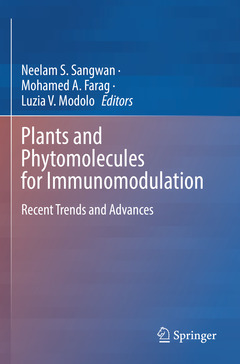Plants and Phytomolecules for Immunomodulation, 1st ed. 2022 Recent Trends and Advances
Coordonnateurs : Sangwan Neelam S., Farag Mohamed A., Modolo Luzia Valentina

This book describes the process of immunomodulation and the plants which possess immunomodulation properties to boost the immune system. The immunomodulation process is highly relevant to address emerging as well as existing diseases in humans. A better immune system triggers the cellular responses for neutralizing and combating the onset of disease conditions. Chapters in the book discuss plants that have profound effects on the health and well-being of humans. They discuss the natural phytochemicals that have immense diversity and uniqueness of molecules. Molecules belonging to phenylpropanoids, terpenoids, steroids, alkaloids, and tannins etc possess a variety of pharmacological activities. The chapters describe how bioactive exert effects even when taken as part of the diet, supplement, and or as traditional herbal medicine. This book provides up-to-date scientific knowledge about the activities and mechanisms and leads in the area of medicinal plants and phytochemicals with immunomodulation properties.
This book is meant for students, academics, researchers, and industry professionals interested in pharmacology, immunology, and plant secondary metabolites.
Prof. Neelam Sangwan, PhD,FNA, FNASc, FNAAS
Dean, School of Interdisciplinary and Applied Sciences; Dean, Research; Head, Department of Biochemistry, Central University of Haryana, India
Prof. Neelam Sangwan has published more than 100 research papers in journals of international repute and implemented externally competitive grant projects. She is recipient of several national awards. Her major area of research is specialized metabolites and metabolism in medicinal and aromatic plants, genomics, molecular understanding of traditional therapies, and phyto-active molecules for pharmacological investigations. She is managing editor of Plant Growth Regulation. Dr. Sangwan has supervised over 50 postdoctoral, PhD, and postgraduate students, and mentored young interns and women scientists. She has visited The Samuel Noble Foundation, USA; John Innes Centre, Norwich, UK, for scientific research programs; and as Women Leaders in Crop Science at Clare College and Cambridge University under Newton-Bhabha program.Farag, PhD
TWAS fellow in AgricultureVisiting Professor, American University in Cairo, Cairo, Egypt
Professor, Faculty of Pharmacy, Cairo University, EgyptSpecializing in metabolomics and natural products chemistry, Mohamed A. Farag completed his PhD at Texas Tech University, USA, in 2003. Dr. Farag now works at the American University in Cairo (AUC) where his research work focuses primarily around applying innovative biochemical technologies (metabolomics) to help answer complex biological questions in medicine, herbal drugs analysis, and agriculture.
He has coauthored more than 216 scientific papers and has more than 6000 citations and an H index of 41. In 2010, Dr. Farag was selected as a top researcher in the field of plant biology in Africa by the American Society of Plant Biology, USA. Dr. Farag is a current TWAS Fellow in Agriculture from Egypt. He is managi
Discusses plant based immunity and natural products as immune enhancers
Describes chemistry, biochemical pathways and genomics of immuno-modulatory molecules
Provides details about phtyochemicals with immunomodulatory properties
Date de parution : 09-2023
Ouvrage de 541 p.
15.5x23.5 cm
Disponible chez l'éditeur (délai d'approvisionnement : 15 jours).
Prix indicatif 105,49 €
Ajouter au panierDate de parution : 08-2022
Ouvrage de 541 p.
15.5x23.5 cm
Disponible chez l'éditeur (délai d'approvisionnement : 15 jours).
Prix indicatif 147,69 €
Ajouter au panier


